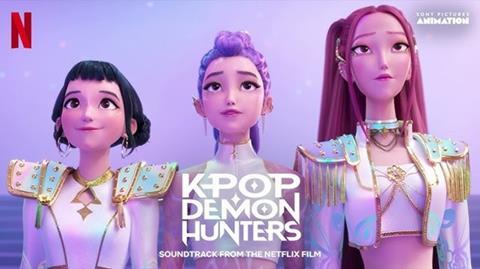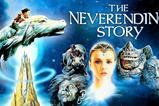KPop Demon Hunters’ climactic song ’What It Sounds Like’ takes us close to the good news of Jesus. Michael J Tinker explains how…

KPop Demon Hunters is a film and soundtrack currently taking the world by storm, with ’Golden’ already being a #1 single. The movie and songs combine Korean traditional folklore and art with modern K-pop and packs a punch stylistically, musically and with its message.
Although ’Golden’ is the hit single, it’s not actually the climatic song of the film. That honour lies with ’What It Sounds Like’ which pulls together the key themes of the movie with anthemic grandeur to rival The Greatest Showman’s ’This Is Me’.
But before we dive into the song, we need to set the scene of the animation, for without it, the song won’t fully make sense.
The story and the songs
The story revolves around Huntr/x, a girl band who double as, you guessed it, demon hunters (I imagine the forward-slash in the name acts like Clark Kent’s glasses in disguising their true purpose). Led by Rumi, this trio not only battle demons with their array of weapons, but their songs also form a protective layer around the world known as the Honmoon, building to the Golden Honmoon which will banish demons forever.
Enter the boyband. In an attempt to stop Huntr/x and weaken the Honmoon, Jinu, a demon who was once human, proposes creating a boy band - the Saja Boys. This hair-swishing collection of bulging-ab’d teens will steal Huntr/x’s fans and open the way to take their souls.
The song that Huntr/x believe will bring in the Golden Honmoon is the appropriately named ’Golden’ - the hit single both in the world of the film and in reality. However, it soon becomes apparent that this isn’t the song they think it is. Something is missing. And here we meet the key theme of the film and why ’What It Sounds Like’ acts as the climatic song.
Rumi realises that exposure of shame is not the worst thing that can happen, and that perhaps there lies the path to restoration
We discover early on that Rumi has ‘patterns’ - dark purple marks on her body that identify her as having ancestral demon blood. She hides these in shame and is in fact advised to by her mentor and former demon hunter, Celine. She is led to believe that when Huntr/x sing Golden they will not only bring about the Golden Honmoon and the final banishment of all demons, but the patterns she carries will also be banished and with them, her shame.
At the same time, the demon-human Jinu also carries shame. In exchange for fame and glory he long ago sold his soul to the devil, Gwi-Ma, abandoning his family. He’s told that if he brings about the end of Huntr/x then his reward will be to have the memories of his family erased. Shame covered by oblivion. Both our lead characters carry great shame and are promised deliverance, only to discover this is a lie.
[Spoiler Alert!] The demons contrive to expose Rumi’s patterns, aiming to shame her and cause a rift in the band. Initially this is successful until Rumi realises that exposure of shame is not the worst thing that can happen, and that perhaps there lies the path to restoration. As Gwi-Ma seems to be winning the day with the Saja Boys drawing more and more people to have their souls sucked from them, Rumi bursts onto the scene and starts to sing ’What It Sounds Like’:
Nothing but the truth now
Nothing but the proof of what I am
The worst of what I came from, patterns I’m ashamed of
Things that even I don’t understand
She’s coming to terms with what she’s been trying to hide. She’s ready to bring them into the light…
I broke into a million pieces, and I can’t go back
But now I’m seeing all the beauty in the broken glass
The scars are part of me, darkness and harmony
My voice without the lies, this is what it sounds like
The themes: ’coming out’ or ‘recovery’?
Here we find all the themes of the film coming together in this anthem. Brokenness, scars, darkness - but now heard, part of the harmony of existence, speaking truth rather than hiding with lies. In this third act of the film Rumi comes to terms with the fact that her brokenness is a part of who she is, shame not to be hidden but brought into the light.
What is really interesting is that the creators felt that Rumi’s story, culminating in this song, mirrors that of ‘coming-out’ as well as recovery from addiction.
If I may contradict the creators for one moment… I think they are only half right.
The story of those who ‘come out’ and those who recover from addiction are quite different. On the one hand they are both stories of shame, but the tale of those who ‘come out’ is told as one of seeing that feeling of ‘shame’ as an imposition of society rather than something that should have been felt. It’s something to change one’s perspective on rather than to find forgiveness for. On the other hand, recovery from addiction necessitates seeing that the shame felt is tied to a reality of wrong choices and actions. Repentance is essential in order to recover, leaving behind an old way and seeking forgives and change. Indeed numbers 5 and 6 of the famous ’12 steps’ recovery program (from Alchoholics Annoymous) are all about this.
Bringing shame into the light does help start the process of healing
With this in mind I think ’What It Sounds Like’, and the film as a whole, more readily reflects a recovering addict than someone ‘coming out’. We find the repeated words of being ‘broken’ and having ‘darkness’ and elsewhere in the film even the word ‘sin’ comes up. The shame felt seems genuinely tied to wrong or evil. Jinu did abandon his family. Although Rumi could not choose her heritage, in this film being a demon is never seen as a good thing to embrace. She is broken and scarred, a darkness remaining within.
The song continues:
Why did I cover up the colors stuck inside my head?
I should have let the jagged edges meet the light instead
This is a reference to a scene earlier in the film where the other members of the trio, Mira and Zoey, confess their own shame, one talking about being a prickly character. It’s #5 in the 12-step program, admitting our faults.
What Rumi and her friends discover is that as they bring their shame into the light their relationships improve - there’s a depth to their friendship that couldn’t exist before when they were hiding things from each other.
The gospel
And this is where we are getting closer to the gospel message than stories of ‘coming out’. Whereas ‘coming out’ involves changing the narrative of shame, the Bible calls us to recognise that we are broken, that we carry genuine shame for those actions and attitudes that are sinful. In 1 John we find that we are liars if we say we are without sin. But John is always quick to offer hope - not in obliterating the memory of wrong as Gwi-Ma offers Jinu or in creating a petty cover for shame as Celine offers Rumi, but rather we are given the sin exposing and the life-giving light. John writes in his account of Jesus’ life: “…whoever lives by the truth comes into the light…” (John 3:21) Jesus is the light of the world (John 3:19) and we can only have true relationship with him if we are also people of the light, owning what we’ve done and seeking forgiveness (1 John 1:7-9).
Ultimately humans alone cannot deliver the forgiveness and transformation that we need to truly find peace. Only God can do that
As Huntr/x sing their song, they experience restored relationships. Bringing shame into the light does help start the process of healing. But something else happens as they sing this song. By the magic of the artist’s pen as Rumi sings, her ‘patterns’ are transformed into beautiful golds never again to reflect the demonic purples. However, what if we don’t have a guardian artist ready to airbrush our shame? It feels like Rumi benefits from the Hollywood effect, a song writer able to bring about a ‘happily ever after’.
What is not answered is what happens when people do the thing again that brought the shame? And what if the shame is tied to something that is more than ancestral? What, if like Jinu, it is something that we have done that we can’t undo? What if, like the addict, we return to our old patterns?
This is where the Gospel of Jesus is so much better than the ‘gospel’ offered in ’What It Sounds Like’. Bringing our shame into the light is step one - but as the song shows, we are still broken. Along with Rumi we need an artist to transform our shame, forgiving us and helping us to change. And in God we have that artist. There is a divine script writer able to bring all things together for the perfect ending.
Read more:
Christian parents can usefully use KPop Demon Hunters to explore themes of idolatry and the Kingdom of God with their family
Stories like Harry Potter can help Christian parents aid their young people through the 3 key challenges of adolescence
God doesn’t just call us to bring our shame into the light as if that action alone will solve everything. We still need the root of that shame dealing with, both in forgiveness and transformation. By the power of the cross, he forgives the root of our shame - our sin. And by the power of the Holy Spirit he calls us not to conform to the ‘patterns of this world’ but to be transformed into the likeness of his Son (Romans 12:2). He will bring this all to completion on the day we see him (Ephesians 4:22-24, Philippians 1:6) He restores us into a new family, one where we are truly known with all our brokenness and scars, a family of forgiven sinners where we are being healed and transformed together.
‘What It Sounds Like’ gets so close to the truth. It recognises the need to bring shame into the light for healing and true relationship. But even Rumi relies on the hand of an invisible artist to bring about transformation. Ultimately humans alone cannot deliver the forgiveness and transformation that we need to truly find peace. Only God can do that.
The final line of the song could be the anthem of the forgiven and transformed people of God:
When darkness meets the light, THIS is what it sounds like.


































